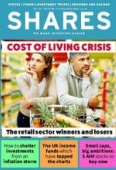Archived article
Please note that tax, investment, pension and ISA rules can change and the information and any views contained in this article may now be inaccurate.
Why Unilever, Reckitt and Nestle are under pressure

Big brand owners in the food, drink and household products space are meant to be reliable names that deliver slow but steady growth no matter the economic conditions. So why is it that names like Unilever (ULVR), Nestle and Reckitt Benckiser (RB.) are struggling on the stock market this year?
The type of stocks sold off in the market rotation from high growth to value are mainly tech companies where rich equity valuations reflect the potential for future profits years down the line rather than ‘jam today’. These tech companies are highly sensitive to rising interest rates which make their future cash flows worth less today.
Unilever, Nestle and Reckitt already generate healthy profits today, yet they have underperformed the global stock market so far in 2022. Unilever is down 5.5%, Reckitt has fallen by 6.9% and Nestle has dropped by 7.7%, versus a 4.4% decline from the MSCI World index, a benchmark for global equities.
One reason behind the underperformance is rising inflation and growing market concern that big brand owners may struggle to raise prices without damaging demand, throwing a bucket of water over the suggestion these companies have robust ‘pricing power’.
Earlier this month Unilever warned that its profit margins would fall in the near-term, which suggests it cannot pass on all the inflationary costs to the customer.
Consumers under financial pressure may trade down to cheaper, supermarket own-brand products which would prompt the likes of Unilever and Reckitt to increase their marketing spend to ensure their brands remain front of mind for shoppers. That puts further pressure on profit margins.
Longer-term share price weakness in Unilever and Reckitt is down to strategic mistakes. The former has struggled under the leadership of Alan Jope, with Fundsmith founder Terry Smith implying the CEO has spent too much time on sustainability factors to show Unilever is a good corporate citizen rather than ensuring the business operates efficiently.
In recent weeks, Unilever’s £50 billion bid for GlaxoSmithKline’s (GSK) consumer healthcare arm was poorly received by investors who worried the price was too high.
Reckitt has already suffered from paying too much to buy infant nutrition firm Mead Johnson in 2017 (a deal worth £13 billion). In 2020 it took a £5 billion impairment on the acquisition and last year it started selling bits of Mead Johnson.
There are rumours Reckitt might exit infant nutrition altogether – look for any comment in its full year results out today (17 February).
Investors might look more favourably on these businesses if they can sharpen their focus. Nestle already seems to be getting its house in order and could be the trailblazer in this regard. Yet near-term headwinds remain for big brand consumer product companies and the sector might not be the shelter from the storm that it once was.
Not everyone is as pessimistic. Speaking at Finsbury Growth & Income’s (FGT) AGM on 9 February, fund manager Nick Train said: ‘Unilever has a wonderful collection of brands that will generate cash for the foreseeable future.
‘It is not the most exciting company on the planet, but it is a formidable, durable asset and I promise people that in years when the world is considerably tougher, you’ll be grateful that part of your portfolio is invested in a business with Unilever’s characteristics.’
Important information:
These articles are provided by Shares magazine which is published by AJ Bell Media, a part of AJ Bell. Shares is not written by AJ Bell.
Shares is provided for your general information and use and is not a personal recommendation to invest. It is not intended to be relied upon by you in making or not making any investment decisions. The investments referred to in these articles will not be suitable for all investors. If in doubt please seek appropriate independent financial advice.
Investors acting on the information in these articles do so at their own risk and AJ Bell Media and its staff do not accept liability for losses suffered by investors as a result of their investment decisions.

 magazine
magazine








